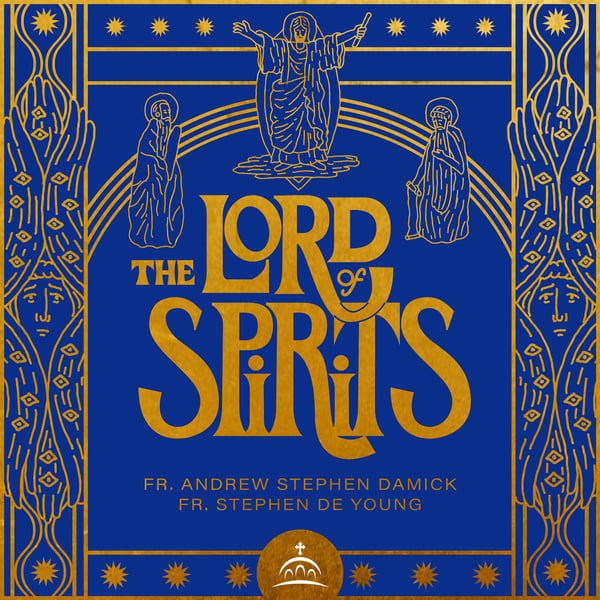The Priest Shall Make Atonement
The Lord of Spirits
Fr. Andrew Stephen Damick, Fr. Stephen De Young, and Ancient Faith Ministries
4.9 • 1.4K Ratings
🗓️ 12 March 2021
⏱️ 132 minutes
🧾️ Download transcript
Summary
Transcript
Click on a timestamp to play from that location
| 0:00.0 | He will be a staff for the righteous with which for them to stand and not to fall, and he will be the light of the nations |
| 0:07.0 | and the hope of those whose hearts are troubled. All who dwell on the earth will fall down and worship him, and they will praise and |
| 0:14.0 | bless and celebrate with song the Lord of Spirits, 1st denoc, chapter 48, verses 4-5. |
| 0:21.0 | The modern world doesn't acknowledge but is nevertheless haunted by spirits, angels, demons, and saints. |
| 0:29.0 | In our time, many year into break free of the prison of a flat, secular materialism, to see and to know reality as it truly is. |
| 0:39.0 | What is this spiritual reality like? How do we engage with it well? How do we permeate everyday life with spiritual presence? |
| 0:47.0 | Orthodox Christian priests, Father Andrew Stephen Damick, and Father Stephen De Young, host this live Colin show, focused on enchantment in creation. |
| 0:56.0 | The union of the scene and unseen as made by God, and experienced by mankind throughout history. Welcome to the Lord of Spirits. |
| 1:07.0 | Thank you, voice of Steve. Well, it's goat week on the Lord of Spirits podcast. I'm Father Andrew Stephen Damick in Emmaus, Pennsylvania, and joining me tonight is my co-host, Father Stephen De Young from Lafayette, Louisiana. |
| 1:23.0 | And if you're listening to us live, you can call in at 855-8F radio. That's 855-237-2346. And we will get to your calls in the second part of today's show. |
| 1:33.0 | Well, like I said, it is goat week. And here at goat week, we've got you covered. And the rest of the show will be explaining that joke. |
| 1:41.0 | So tonight we're wrapping up this three-part series on sacrifice by talking about atonement. It's a word that is core to our understanding of Christianity, and yet there are about as many theories of atonement as there are Christian groups. |
| 1:56.0 | But where did this word come from? What does it mean? What is being atoned for? Do Orthodox Christians have any teaching on atonement? Well, again, we've got you covered. |
| 2:07.0 | And no, I will not get tired of that joke. But first, and this is where the English language nerd in me comes leaping out, let's talk about this English word atonement. |
| 2:17.0 | Okay, so Father Stephen, where is that word from? Name that word. |
| 2:23.0 | It's made up. Not just in the way that all words are made up. It's very deliberately made up. |
| 2:35.0 | They're deliberately invented to describe something that there wasn't really another good word in the English language for. |
| 2:45.0 | That was created for English Bibles to translate a couple of words, one from Hebrew, one from Greek. And what's fun about it is it actually is, so sometimes it gets explained as atonement. |
| 3:05.0 | And that is correct. That is not a false etymology, although usually etymologies that go like that are, like they're just nonsense. |
| 3:13.0 | Butterflies aren't hurled dairy products. They are not. Okay. They are not. And most people who have breakfast are not breaking a fast. |
| 3:23.0 | But right, so atonement atonement, I look this up. So I have on my desk a gigantic dictionary called the Oxford English Dictionary for those of you who know that what that is, you know who you are. |
| 3:39.0 | And I look this up. What is the earliest use of this word? And it turns out that before it ever got into the Bible, there was occasionally this contraction of the word at and the word one. So you get at one, you know, or however, but would have been pronounced back in like the 14th century. |
... |
Please login to see the full transcript.
Disclaimer: The podcast and artwork embedded on this page are from Fr. Andrew Stephen Damick, Fr. Stephen De Young, and Ancient Faith Ministries, and are the property of its owner and not affiliated with or endorsed by Tapesearch.
Generated transcripts are the property of Fr. Andrew Stephen Damick, Fr. Stephen De Young, and Ancient Faith Ministries and are distributed freely under the Fair Use doctrine. Transcripts generated by Tapesearch are not guaranteed to be accurate.
Copyright © Tapesearch 2025.

